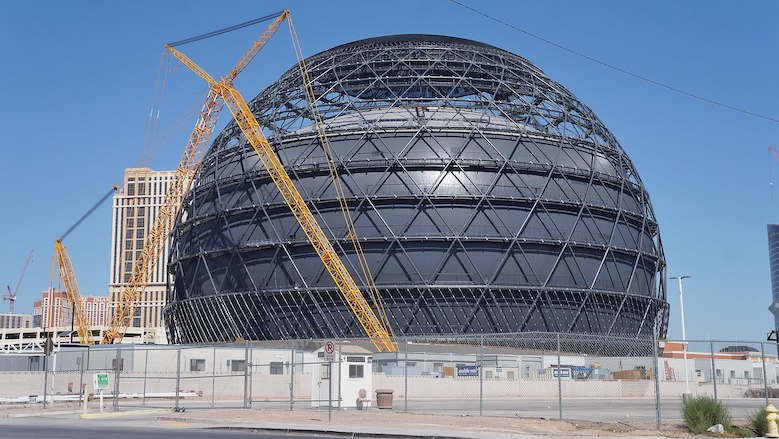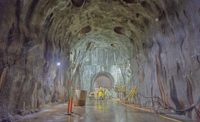The jury trial in the first lawsuit by contractors on the Las Vegas Sphere—the ball-shaped entertainment venue that opened in September—against its developer, Madison Square Garden Entertainment, was once set to start on Feb. 5. That date has been scrapped and a new judge will take over in 2024. But when the trial is finally held jurors may be asked to determine whether a contractor or consultant can be tagged with cost overrun risk even in a project without price guarantees.
The biggest unresolved issue at this moment, awaiting a ruling by an appeals panel of Nevada Supreme Court judges, is whether developer CEO James Dolan must testify.
The 2021 breach-of-contract lawsuit by Rider Levett Bucknall (RLB), the Sphere's former project manager, seeks $3.07 million in unpaid fees. It is the first of several lawsuits for money owed on the project, which blew past its original $1.2-billion estimated cost and was last publicly estimated as $1.85 billion. MSG Entertainment has countersued for tens of millions of dollars, proclaiming in a petition to the court that RLB's work on the project was "deficient in many ways," including its failure to have the proper state license for the work.
In a nutshell, the project management and construction cost consultant says Dolan and MSG Entertainment chose a cost-plus approach, against its advice, and now wishes to make the firm and the project's prime contractor a scapegoat for overruns.
MSG Entertainment claims that better cost estimating and management by RLB and the original prime contractor, Hunt Construction Group, a unit of AECOM, could have prevented much of the cost overrun.
In response to RLB's intention to have Dolan answer questions, MSG Entertainment lawyer Jordan Smith said the CEO was "not personally holding a shovel, pouring concrete or chasing contractor bids," according to a petition to the state Supreme Court appeals panel.
RLB's lawsuit evidence, most of which MSG Entertainment has convinced the trial court judge to seal, now presents a complication for Hunt-AECOM in its separate lawsuit seeking $7.1 million from the developer. Working under what appears from court records to have been a hybrid cost-plus contract, Hunt-AECOM held key subcontracts.
When the developer terminated the company in December 2020 and took over the construction manager's role, some staff were retained, with major subcontractors working on a time and material basis.
Sphere Entertainment, which was spun off by MSG Entertainment last year and now owns the Las Vegas venue, stated in a Dec. 5 securities filing that it does not expect to pay a large part of $224 million of remaining construction costs, much of which is disputed.
M.J. Dean Construction and Harris Rebar are among contractors making claims for payment via lawsuits or liens. From mid-July through October, nine new claimants recorded mechanics' liens against the project, totaling more than $41 million, according to court filings and county lien records. The lien filers may eventually sue or join the existing lawsuits.
(story continues below)

The MSG Sphere at the Venetian hotel in Las Vegas during construction in September 2022.
Photo, slightly cropped: SounderBruce under CC By-SA 4.0 via Wikimedia Commons.
Looming over those cases is the state supreme court pending ruling on whether to shield Dolan from a deposition. That testimony would expose Dolan, whose family controls MSG Entertainment and its sprawling empire of theaters, to tough questions by RLB attorneys.
Clark County District Court Judge Nancy Allf approved last spring the consulting firm's initial request to depose Dolan, but had also agreed to seal from public view a large amount of of business information that MSG Entertainment, as part of trial discovery, provided to RLB. (Full disclosure: RLB supplies data to ENR, but there is no connection to the Sphere project or litigation.)
Nick Tomasino, MSG Entertainment senior vice president of construction, said in a declaration that leaving unsealed proprietary information—including that detailing "Sphere's state-of-the-art LED technology and sound system"—would allow competitors "to copy its work" and "take advantage of MSG's multi-billion dollar and years-long investment."
The companies and attorneys involved are not making public comments. But court filings, often framed by heated accusations, shed light on some of the risk-management choices portrayed by the litigants.
In a motion made to Allf in November, RLB Attorney Lance Coburn said that MSG Entertainment blaming RLB and Hunt-AECOM for the cost overruns “makes little sense" given the absence of a guaranteed-price contract. Without going into details, he claimed the true purpose was to conceal from the public and shareholders that "MSG's [U.S. Securities and Exchange Commission] disclosures regarding the estimate costs to complete the project were consistently lower" than those made to MSG by RLB.
Coburn has also argued that the Sphere was Dolan's "pet project," and "he was very involved in every step of the way."
MSG Entertainment has argued, as it did in a March court filing, that RLB failed to use less intrusive methods of discovery and had a "clear desire to harass Mr. Dolan rather than obtain useful information to prosecute its case." It said RLB has plenty of information from MSG Entertainment staff and its top construction-related managers, to whom Dolan left most project decisions. MSG Entertainment lawyers have asked the court to block the deposition by invoking what is known as the Apex Doctrine, a legal idea not yet adopted in Nevada, which seeks to protect top executives from being pulled into lawsuits where their testimony is not vital.
Attorneys Face Off In Court
One hearing on the Dolan matter took place in state court in March, pitting Coburn against MSG Entertainment attorney Debra Spinelli. Both made arguments to Allf.
Spinelli noted that the Sphere was "a massive project that involves a lot of different things, a lot of different projects, a lot of miniprojects" and "a lot of different contractors, subcontractors, decisions about everything—from "where a bar may be put to whether payments are due even on the smallest things." She said: "There are a lots of things that are involved there that a CEO wouldn't know about."
Spinelli said "what they demonstrate at this point is that Mr. Dolan had some knowledge, he was involved, he's not a CEO that doesn't pay attention to what's going on, especially on a project of this size. But it doesn't demonstrate that he has unique personal knowledge."
In response, Coburn argued that Dolan "was personally required [to review] and he had reviewed and approved specifically the electrical package, the seating, the types of chairs in the arena."
The attorney also said Spinelli mentioned what was "supposed to be the world's longest bar" in this project. He added that "they built it and then [Dolan] came through and deleted it and wanted to take it out."
"He increased the project cost," Coburn continued. "Mr. Dolan's decision against advice increased the project cost and now he's blaming us for increasing the project costs. Absolutely we're entitled to take this man's deposition."
MSG Entertainment, in its reply to Hunt-AECOM's lawsuit, expressed a different point of view about the cost-plus general contracting agreement with the contractor.
Overbilling in construction was common, MSG Entertainment lawyers argued: "The benefit of the cost-plus agreement without a GMP—with proper management by the entities that MSG hired—should have ensured that MSG would pay only for the actual costs of the project itself, plus the contractors' fees."






Post a comment to this article
Report Abusive Comment